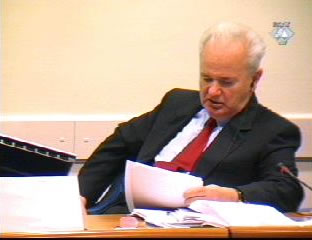Home
“TIGHT” DEADLINES FOR MILOSEVIC’S DEFENSE
The accused will have 150 days to present his defense; every working day lost for any reason other than illness will be counted as a trial day, i.e., it will be subtracted from the total number of days remaining
 Slobodan Miloševic during the cross examination
Slobodan Miloševic during the cross examination At the end of three days of debate, the Trial Chamber did not rule on Steven Kay’s and Gillian Higgins’ request for withdrawal from the case as assigned counsel to Slobodan Milosevic, but it did determine strict deadlines for the conduct of the defence case.
Milosevic will have 150 days for the presentation of his evidence and the trial will continue at the present rate – three days a week. The accused will have to do all other tasks – preparing witnesses or evidence – during the time he is not in the courtroom. Every working day lost for any reason other than illness will be counted as a trial day: it will be subtracted from the total number of days allotted to the accused that still remain.
The responsibility for the conduct of the defense case has now been laid on Milosevic. It is up to him to decide whether he wants to share the burden of preparing witnesses and evidence or writing motions with his legal advisers and/or assigned counsel, or whether he wants to do it all by himself. In any case, he will not get any additional (trial) time for the additional tasks.
Judging that “many important and serious issues” were raised during the three days of debate that will require some time for deliberation, judges indicated that the decision on the request filed by the English lawyers will be delivered soon.
Steven Kay maintained during today’s hearing that he wished to withdraw from the case, noting at one point that in fact he did not need the Trial Chamber’s approval to withdraw. The judges were quite taken aback and obviously disagreed with his stand.
On the other hand, prosecutor Geoffrey Nice stated in his rejoinder that the order of the Appeals Chamber on the modalities for the assignment of counsel cancels any role and purpose of the assigned counsel. Warning of the danger that “the trial may last for an unreasonably long time,” Nice suggested that a very precise time frame be set for the defense case and to leave the accused with the choice of using his time to present evidence in the courtroom or to prepare his witnesses in the Detention Unit.
Milosevic sharply opposed the “absurd proposals” made by the prosecution; according to him, they indicate that “Mr. Nice has pretensions to run the defense.”
Reminding the court that in February 2004 he submitted a list of 17 “hostile witnesses” who should be summoned by the Trial Chamber, Milosevic demanded today that binding orders be urgently issued to former US president Clinton and Secretary of State Albright, British PM Blair, German Chancellor Schroeder and Defense Minister Scharping, and General Clark, former NATO commander in Europe. Milosevic would like to question them, “if possible,” before the Tribunal’s Christmas break.
Judge Robinson used the accused’s request to lecture him. He explained that such orders are not issued lightly and that – if he wants the Chamber to take his request into consideration – he would have to follow the same procedures as the prosecution and the defense of all other accused. The procedure is to submit a written proposal explaining what he has done to bring the witnesses to The Hague and to present arguments to satisfy the Chamber that their testimony is relevant for the case being tried. If he cannot or does not want to write the application himself, Judge Robinson noted, his legal advisers or Mr. Kay can help him, as Mr. Kay remains his assigned counsel until the Trial Chamber’s decision.
Milosevic’s trial will continue on Tuesday, 16 November, with the testimony of Mihajlo Markovic, a member of the Yugoslav Academy of Arts and Sciences, former official and ideologue of the Socialist Party of Serbia.
Linked Reports
- Case : Milosevic Slobodan - "Kosovo, Croatia and Bosnia"
- 2004-11-10 CAN A “STUBBORN ACCUSED” BE ASSIGNED COUNSEL?
- 2004-11-09 KAY: DECISION ON THE ASSIGNMENT OF COUNSEL “UNIMPLEMENTABLE IN PRACTICE”
- 2004-11-03 PREPARATIONS UNDERWAY FOR THE CONTINUATION OF THE MILOSEVIC TRIAL
- 2004-11-16 MILOSEVIC A VICTIM OF DEMONIZATION?
- 2004-11-17 ACADEMY MEMBER SETS “MISCONCEPTIONS” RIGHT
- 2004-11-22 RYZHKOV: I DON’T KNOW ABOUT GREATER SERBIA, BUT I DO KNOW ABOUT GREATER ALBANIA
